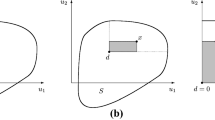Abstract
This article provides an axiomatic characterization of the discrete Raiffa solution for two-person bargaining games. The extension to \(n>2\) players is straightforward. This solution had been introduced as one of four “arbitration schemes” by Raiffa (Arbitration schemes for generalized-two person games, 1951; Ann Math Stud 28:361–387, 1953). The axiomatization expresses a consistency property by which the standard midpoint solution for TU-bargaining games can be extended to general NTU-bargaining games. The underlying linear approximation from inside captures a dual view to the linear approximation from outside that underlies Nash’s (Econometrica 18:155–162, 1950) axiomatization of his Nash solution that is also embodied in Shapley’s (Utility comparison and the theory of games. In La Décision, pp. 251–263, 1969) \(\lambda \)—transfer principle and, even earlier, in a lemma by Harsanyi (Contributions to the theory of games IV, pp 325–355, 1959). Finally, the present axiomatization is compared with other ones in the literature that are motivated by Kalai (Econometrica 45:1623–1630, 1977) axiom of step-by-step negotiation.

Similar content being viewed by others
References
Anbarci, N., Sun, C.J.: Robustness of intermediate agreements and bargaining solutions. Games Econ. Behav. 77, 367–376 (2013)
de Clippel, G.: The procedural value for cooperative games with non-transferable utility. Math. Soc. Sci. 53, 46–52 (2007)
Diskin, A., Koppel, M., Samet, D.: Generalized Raiffa solutions. Games Econ. Behav. 73, 452–458 (2011)
Harsanyi, J.C.: A bargaining model for the cooperative n-person games. In: Tucker, A.W., Luce, R.D. (eds.) Contributions to the Theory of Games IV, pp. 325–355. Princeton University Press, Princeton (1959)
Kalai, E.: Proportional solutions to bargaining situations: interpersonal utility comparisons. Econometrica 45, 1623–1630 (1977)
Luce, R.D., Raiffa, H.: Games and Decisions, Dover Publications, Inc., New York (1957)
Myerson, R.B.: Game Theory. Analysis of Conflict. Harvard University Press, Cambridge Mass (1991)
Nash, J.F.: The bargaining problem. Econometrica 18, 155–162 (1950)
Nash, J.F.: Two person cooperative games. Econometrica 21, 129–146 (1953)
Peters. H., van Damme, E.: Characterizing the Nash and the Raiffa bargaining solutions by disagreement point axioms. Math. Oper. Res. 16, 447–461(1991).
Raiffa, H.: Arbitration schemes for generalized two person games. Report M720–1 R30. Engineering Research Institute University of Michigan (1951)
Raiffa, H.: Arbitration schemes for generalized two-person games. Contributions to the theory of games II. Ann. Math. Stud. 28, 361–387 (1953)
Salonen, H.: Decomposable solutions for n-person bargaining games. Eur. J. Polit. Econ. 4, 333–347 (1988)
Shapley, L. Utility comparison and the theory of games. In La Décision. pp. 251–263. Edited by Guilband GTh Editions du CNRS, Paris (1969)
Shubik, M.: Game Theory in the Social Sciences, The MIT Press, Cambridge, MA (1984)
Sjöström, T.: Stahl’s bargaining model. Econ. Lett. 36, 153–157 (1991)
Tanimura, E., Thoron, S.: A mechanism for solving bargaining problems between risk averse players. GREQUAM Document de Travail. No. 2008–31, Universités d’Aix-Marseille II et III (2008)
Thomson, W.: Independence of irrelevant expansions. Int. J. Industr. Org. 10, 107–114 (1981)
Trockel, W.: An Axiomatization of the Sequential Raiffa solution. IMW Working Paper 425, Bielefeld University (2009)
Trockel, W.: An exact non-cooperative support for the sequential Raiffa solution. J. Math. Econ. 47, 77–83 (2011)
Trockel, W.: Robustness of intermediate agreements for the discrete Raiffa solution. Games Econ. Behav. 85, 32–36 (2014)
Acknowledgments
Financial support of the Deutsche Forschungsgemeinschaft (DFG) under Grant TR 120/15-1is gratefully acknowledged. I also thank my students Lin Yunshan and Ma Hongkun at the RCGEB, Shandong University, Jinan, for engaging in typing this article.
Author information
Authors and Affiliations
Corresponding author
Rights and permissions
About this article
Cite this article
Trockel, W. Axiomatization of the discrete Raiffa solution. Econ Theory Bull 3, 9–17 (2015). https://doi.org/10.1007/s40505-014-0046-4
Received:
Accepted:
Published:
Issue Date:
DOI: https://doi.org/10.1007/s40505-014-0046-4




